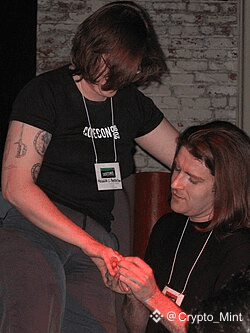

 Len Sassaman
Len Sassaman
(1980–2011) was a prominent American technologist, information privacy advocate, and a key figure in the cypherpunk movement. He is recognized for his significant contributions to cryptography and digital privacy protocols, and speculation exists that he may have been the anonymous creator of Bitcoin, Satoshi Nakamoto.
Key Contributions and Career
Cryptography and Privacy: Sassaman was a strong advocate for using cryptography to protect individual freedoms in the digital age. He worked with Phil Zimmermann on the development of the widely used Pretty Good Privacy (PGP) encryption software and its update, GNU Privacy Guard.
Mixmaster: One of his major contributions was serving as the lead maintainer and operator of the Mixmaster anonymous remailer code, a system designed to send untraceable messages by stripping original headers and routing messages through multiple intermediaries.
Internet Standards: At just 18 years old, he joined the Internet Engineering Task Force (IETF) and contributed to the development of the fundamental TCP/IP protocol.
Conferences and Research: He co-founded CodeCon, an annual conference for tech enthusiasts, and the HotPETS workshop, which focused on privacy-enhancing technologies. He was also a doctoral student at the Katholieke Universiteit Leuven in Belgium, where he researched under notable cryptographers David Chaum and Bart Preneel.
The Satoshi Nakamoto Theory
Due to his extensive expertise in cryptography, anonymity networks, and his sudden death coinciding with the end of Satoshi Nakamoto's online activity, many have speculated that Sassaman was the creator of Bitcoin. Circumstantial evidence supporting this theory includes:
Expertise: He possessed the technical knowledge and community connections to create Bitcoin.
Timing: Nakamoto went silent two months before Sassaman's suicide in July 2011.
Memorial: A tribute to Sassaman, encoded by his friend Dan Kaminsky, is permanently embedded in Bitcoin block 138,725.
Despite the speculation, his wife, Meredith L. Patterson, has stated that she does not believe her husband was Satoshi Nakamoto. His influence on modern digital privacy and security is considered foundational, regardless of the speculation.

